- Home
- Darrell Maloney
The Blockade Page 7
The Blockade Read online
Page 7
Her thoughts were interrupted when another person came out of nowhere and stopped them.
She was a striking woman, very tall and very blonde and in a crisp officer’s uniform.
“I’m Captain Krebbs, the general’s adjutant. I know they wanded you at the door, but I’ll need to do it again. I know it’s a bit of a pain, but the military survives by being redundant. It’ll just take a moment.”
Hannah liked the woman immediately. A mother can spot another mother instantly. Something about the tone of their voice, maybe, or their subtle sense of humor.
There was something else she noticed as well.
Captain Krebbs was the first person she’d seen who wasn’t armed.
She wondered why.
The captain didn’t wait for a staffer to run a metal detection wand over her body and the body of Captain Wright.
She wondered why that was too.
There were plenty of enlisted people in the group who could have done so at her direction. Even a couple of lieutenants.
Instead she chose to do the scan herself, exposing herself to danger if their visitors chose that particular time to lash out and overtake the bunker.
It made no sense to Hannah. She resolved to take the captain aside if she got the chance to ask her about it.
Right now, though, there would be no chance.
Once Captain Krebbs was satisfied she and Wright weren’t armed she placed the wand on a small table against the corridor’s wall.
She said, “Follow me, please,” and walked into the general’s office suite.
In the outer office a clerk sat at a small desk, typing away on a computer. He didn’t look up or stop typing, an indication he knew ahead of time he was a bit player. And as such his greeting or introduction was neither expected nor required.
The captain instructed the pair to sit in easy chairs and said she’d return in a moment.
The chairs were standard government issue: green, vinyl and extremely ugly.
-20-
Hannah was very uncomfortable in the environment. She hoped the worried look on her face conveyed that to Captain Wright when she looked over at him.
It did. He smiled to set her at ease a bit.
It didn’t help.
Both watched Captain Krebbs as she rapped on the general’s office door.
They heard a commanding voice on the inside say, “Enter.”
She went in and closed the door behind her.
As if she didn’t feel uncomfortable enough at the moment, something occurred to Hannah at that very instant which made her feel more so.
Captain Wright assured her she was in no legal or physical peril by going to the bunker. He told her as a civilian she wasn’t subject to military law and couldn’t be prosecuted under the Uniform Code of Military Justice.
But this was the general’s back yard. It was his turf, and he made the rules.
Captain Wright said General Mannix was wrong when he arrested Colonel Wilcox and Colonel Medley for mutinous behavior and treason.
Yet he did it anyway.
Apparently General Mannix listened to the beat of a different drummer. He followed his own set of rules.
What if he had her arrested while she was inside his bunker kingdom, unable to flee?
What if he tossed her into the brig and charged her with the same charges Colonel Medley was awaiting trial for?
If he couldn’t charge her because she was a civilian, perhaps he’d turn her over to civilian authorities and have her charged under a civil statute which mirrored the military charge.
No, she decided. That’s silly. What civilian law could be compared to mutiny or sedition or treason?
Still, she fidgeted in her seat and couldn’t get comfortable, despite Captain Wright’s smiles of reassurance.
The general’s door opened.
Captain Krebbs said, “The general will see you now.”
She held the door open while Hannah and Wright walked past her.
General Mannix stood and offered a broad smile. In the same booming voice they’d heard before, but much friendlier this time, he greeted them as he walked around the desk and held out his hand to Hannah.
He ignored Wright completely. But then again, they’d spoken several times before.
“Welcome to Pentagon West,” he told her. “I apologize for the rather austere conditions. But I’ve had much worse. At least it’s not a four man tent in Afghanistan, with artillery pieces going off a quarter mile away.”
“Yes, sir,” she answered, not quite knowing why she addressed him so formally.
“Please,” he said as he waved his hand toward the two chairs directly in front of his desk. “Be seated.”
Captain Krebbs, Hannah noted, took a standing position against one wall. She stood not at attention, but not at ease either. Straight as a board with her hands folded in front of her, she stood ready to fill any requests the general might have.
And perhaps to come to his aid if Hannah grew so angry she crawled across the desk to strangle him.
“I understand you are a friend of Colonel Morris Medley,” he started.
“Yes. I was a friend of Colonel Tim Wilcox as well, before you drove him to suicide.”
Hannah surprised herself with the brashness of her words. She suspected she might say something so brash to the powerful man sitting before her. But she didn’t expect to find such words so early. Certainly not to start their conversation.
They just rushed out of her, as though her heart overruled her brain and stepped in to choose her words for her. Perhaps her heart just didn’t trust her mind to use words strong enough to convey her true feelings.
In any event, she wasn’t the only one surprised by her opening stance.
Captain Wright winced just a bit and repositioned himself in his seat.
His first thought: if that’s the way she’s going to start, how is this conversation going to end?
Captain Krebbs remained in the same position, her stoic face showing nothing. But she did tense up just a tiny bit.
As for the general, he didn’t seem fazed at all.
He’d participated in fierce debates with Afghan insurgents and Sunni warlords. Iraqi parliament members and Saudi princes. He’d testified before contentious congressmen more times than he could count and even had to sway a less-than-intelligent President or two.
An insolent civilian didn’t bother him much.
But it did make him respect her a bit more.
And that made him, perhaps, a bit more willing to listen to her.
“I respect strong women,” he said.
“Please don’t patronize me, general,” she shot back. “This has nothing to do with my gender. This has to do with what’s right and wrong.”
“Then please let me finish, Mrs. Snyder.
“I respect women who aren’t afraid to say what’s on their minds, to let their true feelings known. You’d be amazed by how many of them speak fiercely in public, or before television cameras, and then who lose all their fire when they sit down at a negotiation table and see faces who oppose them but who feel just as strongly about their own positions.”
“And you never see men behave the same way?”
“Of course. Just not as often. You have to remember, Hannah… may I call you Hannah?”
Without skipping a beat she blurted out, “May I call you Lester?”
She wasn’t sure what reaction she was eliciting from the general, but nonetheless was surprised by his response.
“Of course you may. I get tired of everyone calling me ‘general’ or ‘sir.’ They make me sound like a stodgy old man.
“Anyway… Hannah?”
It was a question. A request to proceed. He was making sure she was comfortable with his using her given name.
She managed a half smile and a slight nod.
He smiled back.
Captain Wright was amazed at how quickly Hannah had tamed this bear. He didn’t know the general was ca
pable of smiling.
-21-
The two continued what was scheduled as a meeting, but which both knew was actually a debate.
“As I was saying, Hannah, you have to remember that society has a lot to do with how we behave as adults.
“It goes back to the crib, and how we’re handled as individuals.
“From the beginning, baby girls are told how sweet they are and how cute they are and they’re praised every time they do something silly or amusing.
“Baby boys are oohed and aahed over how strong they look and the fierce faces they make.
“Girls are given nicknames like Punkin Pie and Sugar Plum and Sweet Cheeks.
“Boys are called Tiger and Big Guy and Champ.
“From the very beginning they’re given their roles in life. They’re told by society, without ever hearing the words, that boys turn into men and their job is to fight wars and protect those back home. That they’re expected to be strong and able and never to stumble.
“Girls are taught to be civil and kind. It’s their job to raise responsible citizens and to pass on the golden rule and to be peacemakers. They find the right words to diffuse conflicts and to try to find a middle ground that everybody can agree to. And to hold down the home front while their men are off somewhere fighting to protect them.
“Like it or not, Hannah, you know I’m right. Society and tradition have a large role in making us the way we are, giving us the attitudes we have, and defining our roles in society.
“Now, having said that, many of us decide at some point in our lives that we don’t want to be pigeonholed in roles we’re not comfortable in. That’s why, especially in this generation and the last, more women are stepping up to the plate and saying, ‘I don’t like staying home and doing dishes. I’m just as capable of fighting for my country as any man and I demand the right to do so. And oh, by the way, women make much better leaders than men because we’re not so hard headed and we know how to compromise and listen to reason. So after I serve my country I’m running for Congress, and I don’t care if you don’t like it.’
“At the same time, men are now finding it comfortable in saying, ‘I’ve never agreed with the idea that men have to be tough as nails and put in protector roles. Not everyone is built to be Marines or policemen or firemen. I’m more comfortable in a role where I can use my head and my reasoning skills more than my fists.’
“That’s why a man in this generation is far more likely to choose a path as a nurse or a teacher or a social worker than they were, say, forty years ago.
“Eventually I think that women will be presumed to be war fighters and that men will be presumed future caregivers, so we can get rid of the early stereotypes. But I won’t see it in my lifetime and you won’t see it in yours.
“I’m a studier of many things, Hannah, and I’ve dabbled in social science over the years. I firmly believe it’s those early stereotypes… calling girl babies sweet and adorable and telling boy babies they need to be rough and tough, that start the problem.
“It’s reinforced over the years by pushing girls toward no contact sports like gymnastics and swimming and tennis and pushing boys toward rougher things like football and rugby and boxing.
“I know, I know. The success of women’s soccer and putting women in the boxing ring are positive changes, but it’s a slow process.
“The whole thing is relative, really. The same forces that tell a man to toughen up and stand his ground the entire time he’s growing up makes him less likely to freeze up and lose his train of thought in a tough negotiation.
“The forces which tell women their whole lives they should be sweet and cooperative and compromising makes them much more likely to cave when the going gets tough. And I’m not talking about the battlefield, where they’re proving themselves quite capable. I’m talking about in a board room, or on a debate stage, or in a negotiation session with enemy combatants.”
“And what beliefs do we pound into little boys’ heads, Lester, which make them much more likely to love to talk, even when their talk turns from talk to lecture?”
She smiled broadly, wanting to let him know there was no animosity in her words.
He caught the nonverbal message and smiled in return.
But rather than accepting the hint and yielding to her, he held the floor just a bit longer.
“Oh, men don’t hold a monopoly on enjoying hearing themselves speak, Hannah. Just as many women are talkers too.
“I credit that particular habit not to my gender, but to my profession and the position I hold. High ranking military officers tend to be long-winded and verbose. No officer, man or woman, ever rose to the rank of four star general by being quiet or timid or reserved. To get to this rank one has to be loud and abrasive, and to beat his or her competitors, both intellectually and verbally.
“And to never stop talking until those competitors give up and go home.”
Hannah wasn’t sure what to expect when she walked into the room. But a personable and self-effacing adversary was something which took her totally by surprise. She was sure that in a different situation this man would be threatening and intimidating and downright terrifying.
But here and now he was almost likeable.
In any event, either she made her point or he was just tired of talking.
“You came here for a reason, Hannah, and I’m willing to listen. Please, explain to me why you think what I’m doing is wrong.
“And why you think I’m responsible for Colonel Wilcox’s death.”
-22-
“Lester, I mean you no disrespect. I really don’t. And for the record, I agree with some of your contentions about being products of our breeding and how we raise our children to play right into stereotypes.
“Some of it but not all.
“You’re right in that my going in position is to compromise, to keep the peace and avoid bloodshed.
“But you should also know that I am also a mother. And we mothers learn that as the primary protectors of our children we have to be prepared to do battle at any time. And when we sense our children are in danger all bets are off.”
“How so? Please enlighten me.”
His words contained no sense of sarcasm or disdain. He sincerely wanted to know.
“We’re like a mama bear. From a distance you might see her ambling along in heavy brush munching on wild berries as though she hasn’t got a care in the world.
“Then the wind changes direction and she catches your scent. The hackles on the back of her neck raise up and she becomes agitated. For she hates man. To her man is evil. He’s a devil. He’s a symbol of death.”
“How does she know?”
“Because she associates his scent with two things.
“Hunters who shoot and kill an animal leave their scent behind when they dress it and pack it out.
“Bears come along and eat the animal’s entrails, or the legs, or whatever else the hunter leaves behind. They’re grateful for the meal. But at the same time the area is tainted with the stench of man. The bear has poor eyesight but an amazing sense of smell. She can smell the sweat from a man’s body for days after he leaves the area. So she learns to associate man with death.
“The other time she encounters man’s scent is at campsites or burned out campfires. She searches those areas long after the campers are gone because sometimes they leave food behind.
“And again, the scent of man lingers for days there. But there’s another hated scent there as well. She can smell the scent of ash. And she associates that with fire, because she’s had to run from brush fires in the area sometimes.
“So the two things she fears the most are man and fire. And when she catches the scent of a man on a passing breeze it freaks her out. That’s certainly understandable.
“Now then. Her first inclination is to run. To get as far away from the man as she possibly can. And since she can certainly outrun him, on flat land or on rough terrain, she usually does.
“But if she’s a mama bear with cubs nearby, everything changes. Her first inclination is to find out where her cubs are to make sure the man doesn’t have access to them. They remain her primary objective. She’ll find them and make sure they’re safe.
“Then she’ll go into combat mode. Instead of fleeing she’ll take a position between the man and the cubs and she’ll prepare herself to fight to the death. Because at that moment her instinct tells her the lives of her cubs are worth more than her own.”
He was fascinated.
Captain Krebbs saw it in his eyes. She’d never seen him pay such rapt attention to anyone before. She stole a look at Captain Wright, who raised an eyebrow. He hadn’t either.
Hannah continued.
“Now then, a human mother is a lot like that mama bear. Say we’re sitting on a bench at a public playground, watching our young children playing with other kids on a jungle gym.
“Out of the park comes a man. He doesn’t necessarily have to look threatening, but he grabs our attention anyway. That’s because looks can be deceiving so we take nothing for granted. Also because nearly all child predators are men. And lastly, if he has no children there he doesn’t belong.
“So our hackles go up immediately.
“We start watching him, out of the corners of our eyes at first and then directly if he gets closer to our children. If he approaches our kids we’re up and running immediately. We get between him and our children and demand he explain who he is and what he wants.
“And we prepare ourselves to fight him if he tries to grab our kids. Like the mama bear we will fight him to the death if we have to. Because like the mama bear our instincts kick in. We realize it’s our job to protect our babies at all costs, because at that point we put more value on their lives than our own.”

 A Perilous Journey
A Perilous Journey The Yellowstone Event: Book 6: The Aftermath
The Yellowstone Event: Book 6: The Aftermath Eden Bound
Eden Bound Without Warning
Without Warning Everything Has Changed
Everything Has Changed Rest in Peace
Rest in Peace This Changes Everything
This Changes Everything The Final Chapter
The Final Chapter It Can't Be Her
It Can't Be Her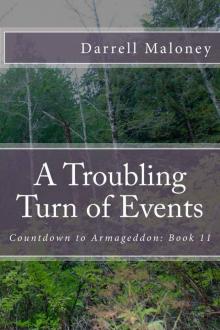 A Troubling Turn of Events
A Troubling Turn of Events The Blockade
The Blockade A Tearful Reunion
A Tearful Reunion Countdown to Armageddon
Countdown to Armageddon Alone, Book 3: The Journey
Alone, Book 3: The Journey The Army Comes Calling
The Army Comes Calling The Grim Reaper Comes Calling
The Grim Reaper Comes Calling Her Name is Beth: Alone: Book 5
Her Name is Beth: Alone: Book 5 Red: The Adventure Begins
Red: The Adventure Begins Rise From The Ashes: The Rebirth of San Antonio (Countdown to Armageddon Book 3)
Rise From The Ashes: The Rebirth of San Antonio (Countdown to Armageddon Book 3) An Unkind Winter (Alone Book 2)
An Unkind Winter (Alone Book 2)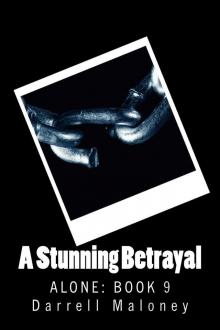 A Stunning Betrayal: Alone: Book 9
A Stunning Betrayal: Alone: Book 9 A Whole New World: Ranger: Book 2
A Whole New World: Ranger: Book 2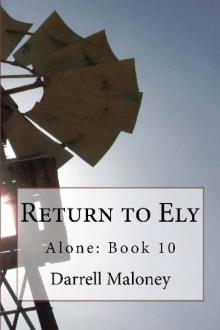 Return To Ely
Return To Ely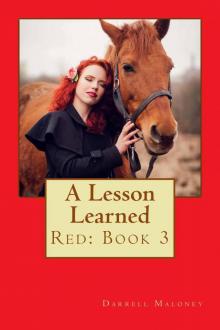 A Lesson Learned: Red: Book 3
A Lesson Learned: Red: Book 3 The Homecoming: Countdown to Armageddon: Book 5
The Homecoming: Countdown to Armageddon: Book 5 Final Dawn: Book 12: Where Could He Be?
Final Dawn: Book 12: Where Could He Be? An Acquired Taste
An Acquired Taste On Desert Sands: Alone: Book 6
On Desert Sands: Alone: Book 6 The Battle: Alone: Book 4
The Battle: Alone: Book 4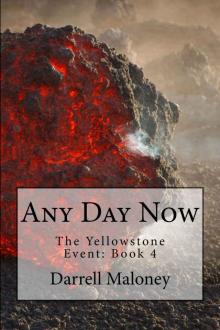 Any Day Now
Any Day Now Too Tough To Tame: Red: Book 2
Too Tough To Tame: Red: Book 2 No Help From Austin: Red: Book 5
No Help From Austin: Red: Book 5 An Unwelcome Homecoming
An Unwelcome Homecoming A New Start: Final Dawn: Book 9 (Volume 9)
A New Start: Final Dawn: Book 9 (Volume 9)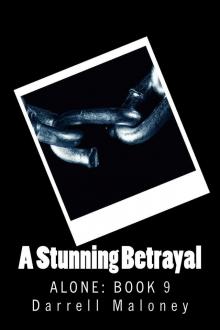 A Stunning Betrayal
A Stunning Betrayal An Undeclared War (Countdown to Armageddon Book 4)
An Undeclared War (Countdown to Armageddon Book 4) One of Our Own: Final Dawn: Book 11
One of Our Own: Final Dawn: Book 11 Texas Bound: Alone: Book 11
Texas Bound: Alone: Book 11 Payback: Alone: Book 7
Payback: Alone: Book 7 The Quest: Countdown to Armageddon: Book 6
The Quest: Countdown to Armageddon: Book 6 The Siege
The Siege The Yellowstone Event: Book 1: Fire in the Sky
The Yellowstone Event: Book 1: Fire in the Sky Return to Blanco (Red Book 4)
Return to Blanco (Red Book 4) The Search
The Search AFTER THE DUST SETTLED (Countdown to Armageddon Book 2)
AFTER THE DUST SETTLED (Countdown to Armageddon Book 2) Death Comes Calling (Ranger Book 3)
Death Comes Calling (Ranger Book 3) A Long Road Back: Final Dawn: Book 8
A Long Road Back: Final Dawn: Book 8